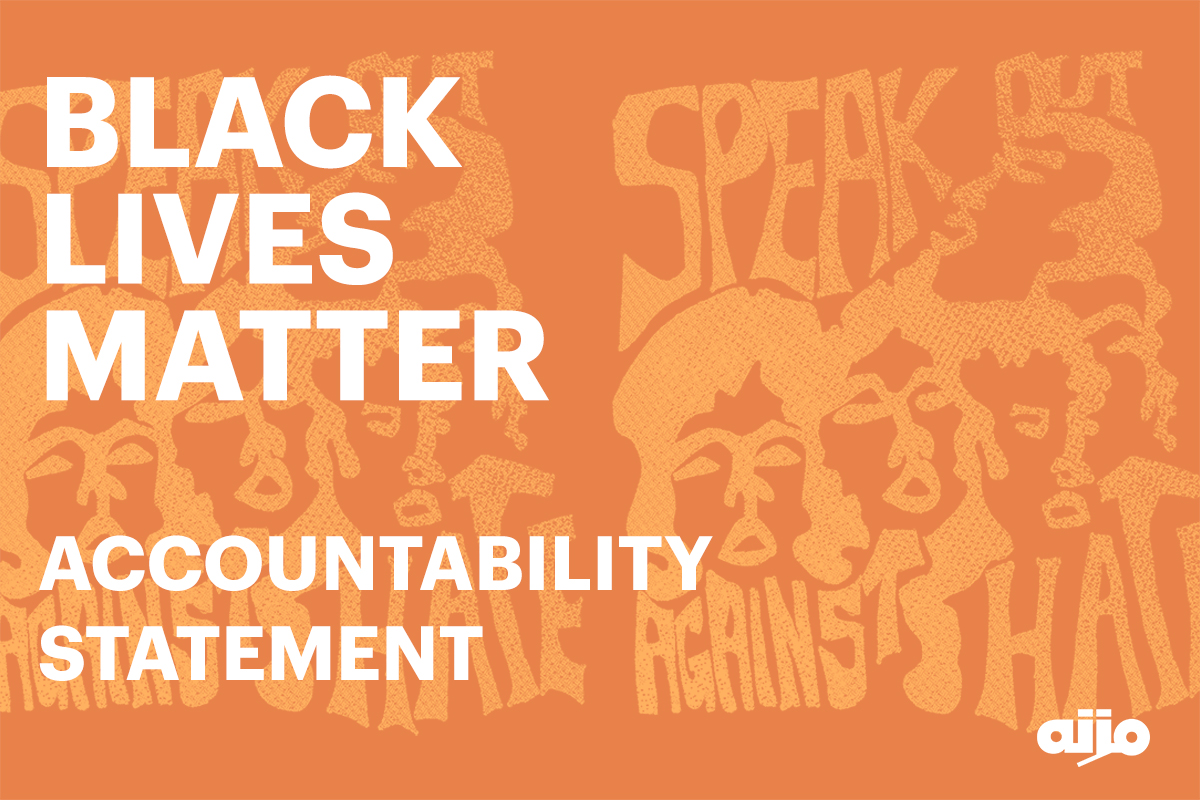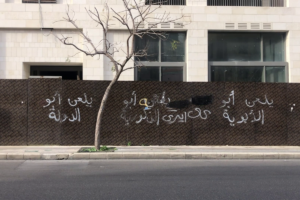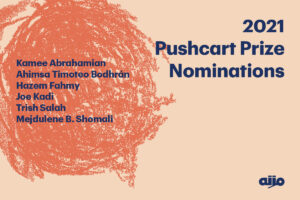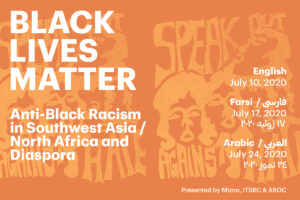
Accountability Statement
Mizna read the below accountability statement to commence the webinar series addressing anti-Black racism in SWANA + Diaspora communities. See our statement on the murder of George Floyd here, and watch the recorded webinars here.
Hello, I’m Lana Barkawi, the Executive and Artistic Director at Mizna, a nonprofit arts organization with a mission to provide a critical platform for Arab and Southwest Asian and North African film, literature, and art. Together with our partners the Imagining Transnational Solidarities Research Circle and the Arab Resource and Organizing Center and a number of co-sponsoring orgs., I am happy to welcome you to the first in this webinar series called Black Lives Matter: Anti-Black Racism in SWANA and Diaspora. This English-language discussion will be followed by ones in Farsi and in Arabic in the coming weeks. I’ll be giving some context and letting you know how we are committing to being accountable to racial justice before passing things over to the moderators who will introduce our incredible panelists.
You may be wondering about the term SWANA, which stands for Southwest Asia and North Africa. This is a decolonized term that describes the region without centering Europe the way that a term like “Middle East” does, and rather describes the region from a geographic basis. It was suggested by SWANA feminist and queer scholars in the 90s and we have put it into practice.
This webinar series grew out of the aftermath of the murder of George Floyd by the Minneapolis police, in the metropolitan area that Mizna, ITSRC, and some of our cosponsoring organizations call home. It grew out of our grief and anger at the ongoing, anti-Black racism that permeates every aspect of life and is killing Black people. This is a galvanizing moment when we are witnessing an unprecedented global, multiracial challenge to racism as a historical system.
In heeding the call of this transformative moment, of the hopefulness and challenge of this important time, Mizna and ITSRC as the lead organizers, are committing to be accountable to the Black Lives Matter movement for racial justice. We recognize that anti-Black racism is not only a pandemic of the West, but it is embedded in the history and present of our own SWANA communities. For far too long, our majority non-Black SWANA communities have benefitted from the privilege of being light-skinned in systems built on white supremacy and anti-Black racism. Both in our home countries and in Diaspora, there are countless ways that we have been complicit in the injustices faced by Black people. In every country in the SWANA region, there are Black people. They are Black Arabs, Black Iranians, Black Turks, Black Kurds, Black Assyrians, Black Armenians, Black Jews, Black Alevis, Black Amazigh, Black bedouins, as well as Black people in many other ethnic groups in the SWANA region and its Diaspora. Many have lived in the SWANA region for centuries and are integral to the history, culture, politics, and economy of the region. And while their lived experiences and their experiences of racism may vary regionally or be different from the U.S. Black experience, they also face stigmatization, discrimination, and erasure because of the historical prevelance of white supremacy around the world. Even as the Black Lives Matter movement has sparked an awakening to anti-Black racism in the US among non-Black SWANA people, Black SWANA people remain invisible to the SWANA consciousness. The inequalities and racist attitudes towards Black SWANA people are rarely discussed in the political realm and in cultural productions associated with the SWANA region and its Diaspora, even as Black SWANA people have had no choice but to have these discussions because of their lived experience.
We have to stop the practices that perpetuate a harmful divide between non-Black and Black SWANA people in our communities and organizations, without erasing the discrimination that Black people often face in our region, or erasing Blackness in our communities. We recognize that the struggles of all SWANA people are absolutely intertwined with the struggles of Black SWANA people. Our solidarity with the struggle to free Palestine, with the fight to lift the sanctions on Iran, with the activism against U.S. militarism and Israeli settler colonialism, with the struggles against dictatorships and security states, with the fight against cis-hetero patriarchy, with the fight against xenophobic immigration policies, with the confrontations to ablist practices and laws, and with the contestations to neoliberal policies in the U.S. and in the SWANA region, are all connected to, and contingent on Black liberation. None of us will be free until Black liberation is achieved.
We are committing to take the work of Black Lives Matter beyond this web series. We acknowledge that Blackness should not only enter our conversations when acts of violence are perpetuated against Black people, or in moments of crisis. That our commitment to anti-Black violence and racism should have been reflected in our organizational makeup prior to this particular historical moment. Building on our organizations’ past work for racial justice and acknowledging that we need to do a lot better, we pledge that our commitment to racial justice will continue and deepen by meaningfully engaging with Blackness in our communities.
Mizna and ITSRC are made up of non-Black SWANA people in decision-making roles. We recognize that this is a problem that is rooted in anti-Black racism, and we commit to changing that. We commit to proactively and meaningfully making our organizations and research groups inclusive of the Black members of our communities in leadership roles by ensuring that our organizational boards, our paid staff, or our research collaborations include Black people. We commit that in all of our programs and activities, racial justice and fighting anti-Black racism will be central to our continuing values and practices. Mizna and ITSRC are not large or well-resourced organizations or research projects. We have a history of doing work from a social justice–based value system, however, we recognize that whatever our particular situation and resource limitations, there is no valid reason that excuses the current lack of representation of Black SWANA people among our board, staff, or research groups. In our joint struggle, we know that coalition building and solidarity are active commitments, and that we must educate ourselves and the communities that we serve to acknowledge and fight the active presence of anti-Blackness in our multiple homes—in SWANA and Diaspora. We know that we will on occasion make mistakes, and we will work to learn from them. This an active commitment made from a place of love, hope, and joy, knowing that a racially just world is achievable if each of us accepts our role and agency in the joint struggle to dismantle racism in its many articulations. I welcome you to follow our organizations’ work going forward, and to hold us accountable to this commitment.










